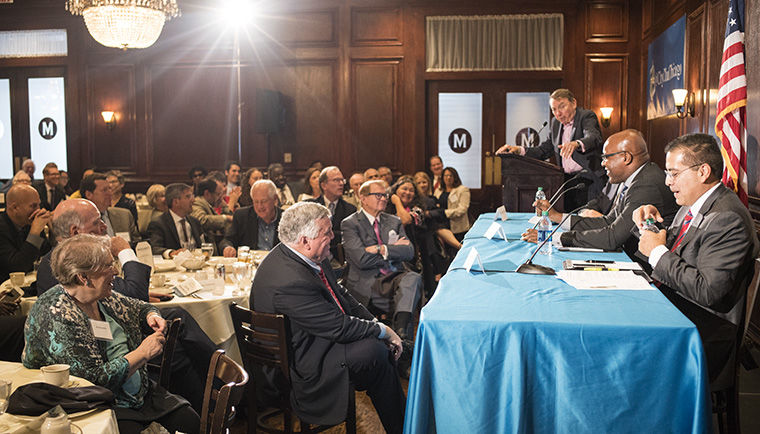City Club panel calls for representation in CPS
The attendees laugh at a statement made by State Senator of the 13th Legislative District Kwame Raoul and Moderator, Board of Governors member Paul M. Green. City Club Chicago held a forum titled Elected School Board Yes or No. Three guest speakers spoke their opinions and answered questions from the attendees. The forum was held at Maggiano’s Little Italy Banquet Hall, 111 W. Grand Ave. on Aug 29.
September 6, 2016
High dropout rates, increasing debt and controversy over governance have heavily plagued Chicago Public Schools for more than a decade.
Numerous critics blame the current school board, one of only two school districts in Illinois without elected representation, said State Representative Robert Martwick, who discussed the issues at a panel hosted by City Club of Chicago on Aug. 29 at Maggiano Banquets in River North.
The City Club of Chicago is a non-profit, non-partisan organization that holds open forums to discuss Chicago affairs. The organization led a debate about changing Chicago’s appointed school board to an elected one.
Two of the speakers at the forum, Rep. Martwick and State Senator Kwame Raoul, were in favor of an elected school board and are sponsors of House Bill 0557. The bill calls for a replacement of the seven-member board appointed by Mayor Rahm Emanuel with a democratically elected 20-member body, which would be chosen through district elections.
Jesse H. Ruiz, president of the Chicago Park District Board of Commissioners—appointed by Emanuel last November—and the CCoC’s third guest speaker, defended the current system.
Martwick strongly advocated providing the community with representation within the school board, arguing when 55 percent of property taxpayer dollars go to education, residents deserve to have a voice within that system. He added that representation from all districts ensures responsive school boards.
“Whether the decision is right or wrong, citizens who are paying the bill should have a voice in the process,” Martwick said.
Raoul discussed the importance of diversity in schools. He said allowing high-achieving students to be taken by North Side and downtown schools drains neighborhood schools of resources and creates a lack of diversity in the city’s schools.
Backing up Martwick’s argument, Raoul added he wants to bring democracy to CPS.
“We’ve embraced democracy for every school district but Chicago, and it’s time to change,” Raoul said.
Raoul also encouraged community involvement, adding that engagement is necessary for progress.
Ruiz made note of President Obama’s appointees, such as former U.S. Secretary of Education Arne Duncan, to draw parallels between the two systems.
He also argued an elected school board would bring more money into politics when the priority should be taking the money out of it.
“There will be more, not necessarily politics, but a lot more money.” Ruiz said.
President of VIA Times Newsmagazine and event attendee Elsie Sy-Niebar asked how an elected board would preform better than an appointed one.
“With an elected school board, you have the ability to hold them accountable,” Martwick responded.
A question that piqued the audience’s interest came from a Northside College Preparatory High School student, who asked if panelists were in favor of allowing students to occupy a seat on the school board.
Martwick said there is not a specific position for students—however they would sill be eligible to run for office.
Ruiz noted there is already an honorary student position, encouraging students to attend and give representation at every Chicago school board meeting.
Backing up his early calls for diversity, Raoul said a democratically elected student member would be a good idea.
Katherine Konopasek a retired CPS principal, who left because of the “system” feels that reform is needed and an elected school board could provide that.
Later, Konopasek added “It was wonderful that there was the opportunity to speak toward an elected school board.”








